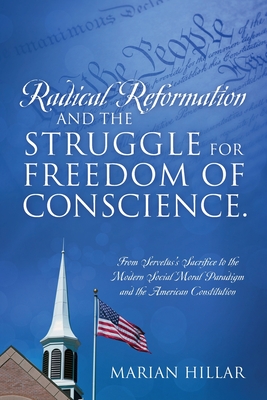Radical Reformation and the Struggle for Freedom of Conscience.: From Servetus's Sacrifice to the Modern Social Moral Paradigm and the American Consti

Radical Reformation and the Struggle for Freedom of Conscience.: From Servetus's Sacrifice to the Modern Social Moral Paradigm and the American Consti
The Reformation brought new trends in religious practice to 16th-century Europe and initially emphasized a need for tolerance, but, unfortunately, the "reformed" churches quickly became as intolerant as the old Roman church. However, another trend developed in the 16th and 17th centuries whose aim was a complete renewal of Christianity--the Reformed Church, developed in Poland. The Polish Brethren attracted other reformers fleeing persecution in Europe--who found refuge as the nobility refused to obey the Catholic Church and instituted laws guaranteeing freedom to all religions. In time this movement grew into Socinianism, which developed the modern political, social, moral, biblical, and theological ideas of the Enlightenment.The main ideal of the Radical Reformation and its expression in the movement of Socinianism--complete freedom of conscience and separation of religion from state--initiated change in the Social Moral Paradigm, and was expressed in the First Amendment to the American Constitution. Radical Reformation explores the roots of this development and arose from the study of Michael Servetus, a biblical scholar and a reformer in the 16th century who initiated a radical reform in practice and doctrines of the church.The Reformation brought new trends in religious practice: the assertion of individual, personal experience as a basis for religion, an emphasis on biblical studies, and the search for biblical principles. It also underscored in its initial phase, the need for tolerance, for its own survival. Unfortunately, the "reformed" churches quickly became as intolerant as the old Roman church and ossified the old dogmatic tradition, persecuting any deviation from ideology of their leaders. However, there was another trend developed in the XVIth and XVIIth centuries that aspired for complete renewal of Christianity. This was the Reformed Church that developed in Poland in the XVIth century and the members called themselves Polish Brethren and with time attracted other reformers who were persecuted in Europe and fled their countries to Poland. Here they found refuge for about 100 years as the nobility refused to obey the Catholic Church and instituted laws guaranteeing freedom to all religions. In time this movement grew into the widely spread Socinianism, which developed the modern political, social, moral, biblical, and theological ideas of the Enlightenment.This book traces the roots of the development of the XVIth century movement in Pol
PRP: 131.94 Lei
Acesta este Pretul Recomandat de Producator. Pretul de vanzare al produsului este afisat mai jos.
118.75Lei
118.75Lei
131.94 LeiIndisponibil
Descrierea produsului
The Reformation brought new trends in religious practice to 16th-century Europe and initially emphasized a need for tolerance, but, unfortunately, the "reformed" churches quickly became as intolerant as the old Roman church. However, another trend developed in the 16th and 17th centuries whose aim was a complete renewal of Christianity--the Reformed Church, developed in Poland. The Polish Brethren attracted other reformers fleeing persecution in Europe--who found refuge as the nobility refused to obey the Catholic Church and instituted laws guaranteeing freedom to all religions. In time this movement grew into Socinianism, which developed the modern political, social, moral, biblical, and theological ideas of the Enlightenment.The main ideal of the Radical Reformation and its expression in the movement of Socinianism--complete freedom of conscience and separation of religion from state--initiated change in the Social Moral Paradigm, and was expressed in the First Amendment to the American Constitution. Radical Reformation explores the roots of this development and arose from the study of Michael Servetus, a biblical scholar and a reformer in the 16th century who initiated a radical reform in practice and doctrines of the church.The Reformation brought new trends in religious practice: the assertion of individual, personal experience as a basis for religion, an emphasis on biblical studies, and the search for biblical principles. It also underscored in its initial phase, the need for tolerance, for its own survival. Unfortunately, the "reformed" churches quickly became as intolerant as the old Roman church and ossified the old dogmatic tradition, persecuting any deviation from ideology of their leaders. However, there was another trend developed in the XVIth and XVIIth centuries that aspired for complete renewal of Christianity. This was the Reformed Church that developed in Poland in the XVIth century and the members called themselves Polish Brethren and with time attracted other reformers who were persecuted in Europe and fled their countries to Poland. Here they found refuge for about 100 years as the nobility refused to obey the Catholic Church and instituted laws guaranteeing freedom to all religions. In time this movement grew into the widely spread Socinianism, which developed the modern political, social, moral, biblical, and theological ideas of the Enlightenment.This book traces the roots of the development of the XVIth century movement in Pol
Detaliile produsului








